Outgoing CENTCOM Commander Discusses Iran During Israel Visit
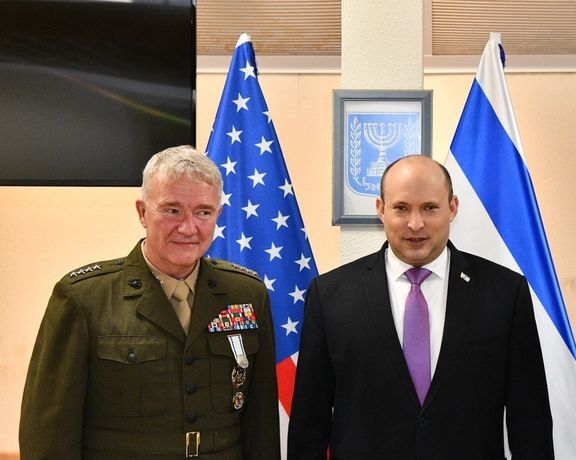
The outgoing chief of the United States Central Command (CENTCOM) visited Israel to discuss maintaining regional stability and threats posed by Iranian threat.

The outgoing chief of the United States Central Command (CENTCOM) visited Israel to discuss maintaining regional stability and threats posed by Iranian threat.
General Kenneth F. McKenzie Jr, who arrived on Wednesday for the last time in his official position, was the guest of IDF Chief of Staff Lieutenant-General Aviv Kohavi, and met with President Isaac Herzog, Prime Minister Naftali Bennett and Defense Minister Benny Gantz on Thursday.
A statement by the Israeli prime minister said that they discussed the common security challenges facing Israel and the US, “especially Iran's aggression in the region” as well as in Syria and Lebanon.
“The Prime Minister also stressed the real danger of the [world] powers signing the nuclear agreement [with Iran], if and when it occurs,” the statement said.
Referring to Israel’s move from the US military’s European Command (EUCOM) to CENTCOM, Gantz stressed the importance of Israel’s integration into CENTCOM, saying it “enables us to increase cooperation to maintain a more secure and stable Middle East.”
“We also discussed challenges both near and far, including Iranian regional aggression, and the developing conflict in Ukraine”, he twitted.
Asharq al-Awsat cited sources in Tel Aviv that this visit was scheduled for the end of the month, but McKenzie arrived ahead of time to witness joint drills by US and Israeli air forces over the Red Sea aimed at improving capabilities in shooting down drones by Iran-backed groups.
McKenzie will be succeeded by Lt. Gen. Michael Kurilla who currently serves as commander of the US Army 18th Airborne Corps.

Saudi Arabia plans to continue "detailed talks" with its rival Iran to reach a satisfactory agreement for both, Crown Prince Mohammed Bin Salman has said.
He also reiterated Riyadh’s view for a strong nuclear deal between Tehran and world powers at talks in Vienna, concerned about both Tehran’s nuclear ambitions and its regional aggression.
He said in remarks to The Atlantic carried by Saudi state media on Thursday that direct talks with Iran would enable reaching "a good situation and mark a bright future" for the region's Sunni Muslim and Shi'ite powers, which have been locked in a rivalry playing out in conflicts across the Middle East.
"Iran is a neighbor forever, we cannot get rid of them, and they cannot get rid of us," the Saudi state news agency cited him as saying.
Saudi Arabia supported former US president Donald Trump’s decision to withdraw from the Obama-era nuclear agreement known as JCPOA and favored his tough policy toward Tehran.
In September 2019 after Trump had fully sanctioned Iran’s oil exports, a large missile and drone attack hit Saudi oil installations in what was widely believed to have been an Iranian operation.
Riyadh had to navigate a delicate diplomatic terrain after Joe Biden became president with a clear agenda to restore the JCPOA and give less freedom of action to the kingdom. Biden removed a terror designation from Yemen’s Houthis early in his term.
Ben Salman’s comments come as indirect US-Iran talks in Vienna move closer to reviving a 2015 nuclear pact which curbed Tehran's nuclear program in exchange for sanctions relief.
Riyadh and its Gulf allies had seen the pact as flawed for not addressing their concerns over Iran's ballistic missiles program and network of proxies, including in Yemen where Saudi Arabia is embroiled in a costly war.
"We do not want to see a weak nuclear deal because the result will be the same in the end," the prince said.
Riyadh severed diplomatic ties with Tehran in 2016 after Iranian authorities allowed mobs to attack Saudi diplomatic mission, setting fire to its embassy. The two countries launched talks last year hosted by Iraq aimed at containing tensions, but no breakthrough was achieved.
Saudi Arabia's foreign minister said last month the kingdom was looking to schedule a fifth round of talks despite a "lack of substantive progress" so far and urged Tehran to change its behavior.
Shared concerns over Iran saw Riyadh's Gulf allies the United Arab Emirates and Bahrain forge ties with Israel in 2020 to create a new regional axis at a time of uncertainty over the commitment of key security ally the United States.
"We do not look at Israel as an enemy but as a potential ally in various interests that we could seek to achieve together. But it should solve its problems with the Palestinians," Prince Mohammed was cited as saying by the state news agency.
Saudi Arabia, home to Islam's two holiest sites, has conditioned any eventual normalization with Israel on addressing the Palestinians' quest for statehood on territory captured by Israel in the 1967 Middle East war.
With reporting by Reuters
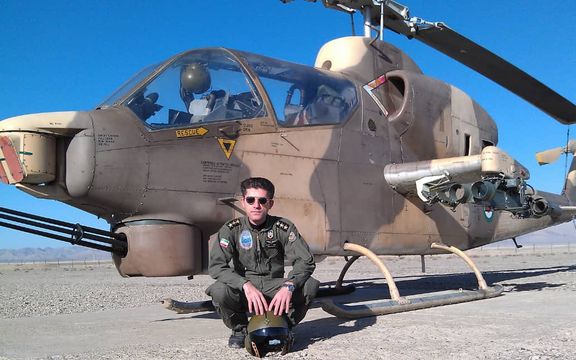
Turkish prosecutors seek a 30-year prison sentence for 11 defendants, including at least one Iranian, charged over an alleged scheme to abduct Mehrdad Abdarbashi, an Iranian military pilot who fled to Turkey rather than serve in Syria.
Turkey's official news agency Anadolu (Anatolia) reported Wednesday that the 30-year term was demanded by the Prosecutor General's Office of Van province. The agency alleged Iranian intelligence had set up a $30,000 network in Van that had attempted three times to take Abdarbashi back to Iran. Anadolu earlier reported that the National Intelligence Organization (MIT) and police had arrested eight people, including an Iranian, in Van, south-east Turkey, September 24.
Speaking to Türkiye newspaper, Abdarbashi, a major and air-force helicopter pilot, said he had fled Iran and sought asylum after refusing to go to Syria. He told the newspaper a female Iranian intelligence agent had invited him to a house. He alerted Turkish authorities, and after she drugged him and others were preparing to abduct him, Turkish agents swooped.
In 2019 a ‘honey-trap’ was allegedly used to lure Ruhollah Zam, who ran a social-media channel on Telegram, to Iraq where he was abducted. Zam was executed in December 2020 after confessions aired on state television.
In February, Turkey arrested eight in an alleged Iranian plot to assassinate Israeli-Turkish businessman Yair Geller in revenge for the killing of nuclear scientist Mohsen Fakhrizadeh in 2020.
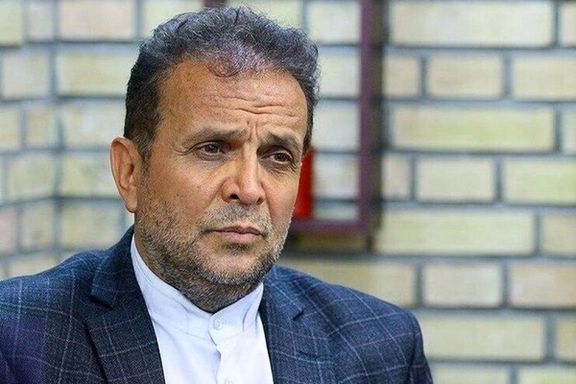
A senior Iranian lawmaker says the Islamic Republic’s position is close to that of Moscow on the issue of the Russian invasion of Ukraine.
The spokesman of the parliament's National Security and Foreign Policy Committee, Mahmoud Abbaszadeh-Meshkini, said on Wednesday that NATO has gone far beyond its territory in recent years and has faced a response from Russia.
He described the Russian attack on Ukraine as “a precautionary measure” to push NATO back to its place, noting that NATO did the same to Iran. “To surround us, they occupied Iraq and Afghanistan and imposed war on Syria, and the Islamic Republic helped to prevent larger wars at the request of their governments”, he added.
Abbaszadeh-Meshkini noted that there is a common problem in the world, and that is “the Westerners have expanded their hegemony with the help of NATO and are occupying wherever they want under the name of ‘preventive war’”.
The Islamic Republic has subtly supported Russia since the invasion began by accusing the United States and NATO of provoking the conflict.
Pundits and media in Iran are still heatedly debating the Russian invasion of Ukraine, West's reaction and Iran's official stance of implied support for Russia.
Iran’s state media and hardliner outlets have avoided using the word ‘invasion,’ while conservative and reformist media have in some instances criticized Russia for the invasion or expressed more nuanced views.
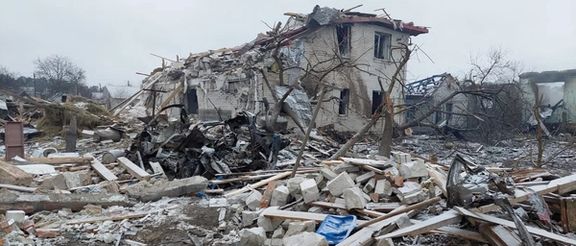
Pundits and media in Iran are still heatedly debating the Russian invasion of Ukraine, West's reaction and Iran's official stance of implied support for Russia.
In a televised speech Tuesday, Iran's Supreme Leader detected a ‘colored coup’ in Ukraine, referring to past United States-backed ‘colored revolutions’ in eastern Europe.
Ali Khamenei said Iran was “in favor of stopping the war,” which he blamed on the United States and Nato, following President Ebrahim Raisi earlier explaining the Ukraine crisis in terms of Nato’s eastern expansion, which has taken in 13 countries since 1999.
Iran’s state media and hardliner outlets have avoided using the word ‘invasion,’ while conservative and reformist media have in some instances criticized Russia for the invasion or expressed more nuanced views.
Kayhan newspaper, the hardliner flagship, has blamed Nato and the US. A note published Wednesday contrasted Iranians who defended their country against the 1980 Iraqi invasion, while Ukrainians did not even "pretend to resist as much as a scarecrow" and fled across the borders.
Kayhan’s statement was labeled as an insult to the Ukrainian people on social media, while the comment obviously contrasts with international admiration for Ukrainian people’s resistance.
The conservative Alef has both censured Russia over the invasion and argued out Nato had set Ukraine up as a victim. Like most other countries in the Middle East, Alef said, Iran should remain neutral and try to contribute to a diplomatic solution.
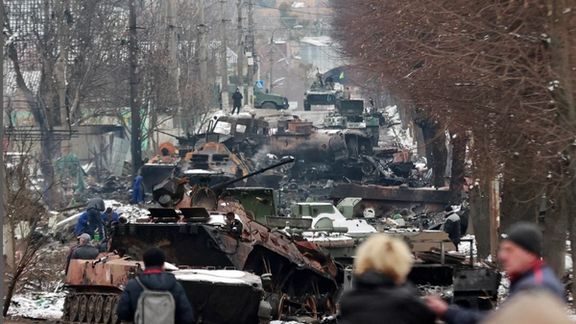
Double standards
Jafar Mohammadi, editor of the conservative Asr-e Iran website, was also nuanced. "Russia's attack on Ukraine is a clear breach of international regulations and a crime against humanity," he wrote Tuesday, while criticizing Nato for failing to stop Russia. Mohammadi also highlighted double standards over Ukrainian refugees compared to Syrians and Afghans, as well as over Israeli occupations and Saudi Arabia bombing cities in Yemen.
"That they have driven the invading Russia to a corner of isolation and sanctions is a very good measure,” Mohammadi wrote. “That's what an aggressor deserves, but they must show the same response to other aggressions, which they don't, and the outcome is an unsafe world in which even the value of children's blood is measured by the color of their eyes.”
Russia appears to see Iran as an ally in the war against Ukraine. The Russian embassy in Tehran Wednesday published on Twitterand Instagram photos from Iran including an Iranian flag with ‘We Support Russia’ in Persian. It claimed these were from a "flash mob of Iranians in support of the Russian army with the sign 'Z'". A few photos published in the tweet do not show a ‘flash mob.”
Blind enmity
In February, some Iranians expressed anger on social media when the Russian embassy honored Alexander Griboyedov – ambassador, promising writer and friend of Aleksandr Pushkin – who along with all the Russian embassy staff was murdered by a Tehran mob in 1829.
Hundreds of Iranians on social media have been expressing anger at the invasion in the past six days and criticizing the government’s position. Some are attacking Supreme Leader Ali Khamenei, calling him a lackey of Russia.
Reformist commentator Sadegh Zibakalam suggested phobia towards the West and "blind ideological enmity" had prevented Iranian officials from having a realistic understanding of developments such as the Ukraine crisis.
For Zibakalam, this explained notions that Ukraine had been “deceived by the West” or that “Western [powers] are responsible for the war because they wanted to expand Nato towards Russia." Zibakalam took it upon himself Tuesday to apologize to Ukrainians for the Iranian government's stance.

Iran likely suffered another failed launch of a satellite-carrying rocket in recent days attempting to reinvigorate a program criticized by the West.
The attempted space launch came as Tehran faces last-minute negotiations with world powers to save its tattered nuclear deal in Vienna.
Satellite images from Maxar Technologies seen by The Associated Press show scorch marks at a launch pad at Imam Khomeini Spaceport in Iran's rural Semnan province on Sunday.
A rocket stand on the pad appears scorched and damaged, with vehicles surrounding it. An object, possibly part of the gantry, sits near it.
Successful launches typically don't damage rocket gantries because they are lowered prior to takeoff.
The United States says that space launches by Iran could be a cover to develope intercontinental ballistic missiles that would be able to deliver nuclear warheads.
Iran also usually immediately trumpets launches that reach space on its state-run television channels, and it has a history of not acknowledging failed attempts.
Iran's mission to the United Nations did not immediately respond to a request by the Associated Press for comment, nor did the US military.